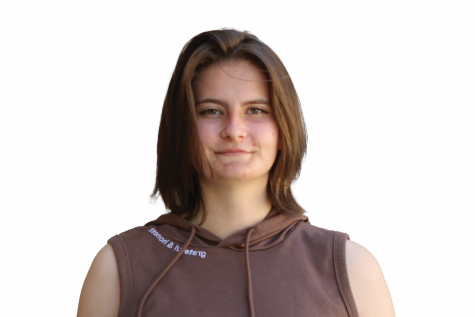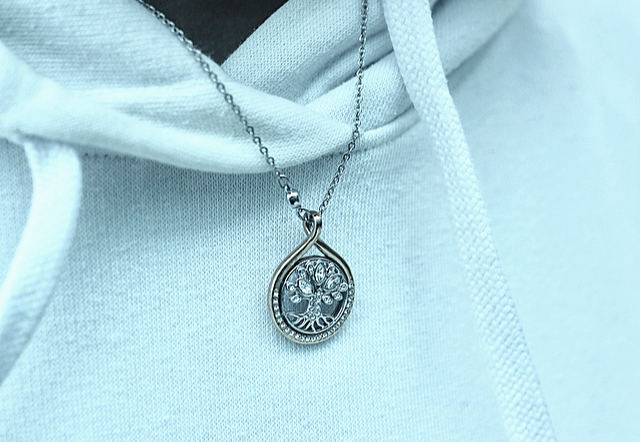
Twitter: @kor_maya
View her portfolio at: mkornyeyevajournalism.weebly.com
January 20, 2020
Sophomore Bianca Johnson, the defensive specialist for the Carlmont JV volleyball team, shifts her weight from foot to foot.She and her teammates are ready to put their best efforts into this game.
Her hair pulled back in a tight ponytail with a black elastic band, but otherwise prepared in the same fashion as always, Johnson feels particularly lucky.
“For me, playing well corresponds with my hairstyles. A normal high ponytail rather than a scrunchie [is my go-to]. If I’m doing something a certain way, something’s going to work out for me,” Johnson said.
She has noticed something similar in the actions of her fellow players.
“Some people have certain shoes that they have to wear, typically Nike basketball shoes. Everyone wears them to do better in the games,” Johnson said.
Other Carlmont students feel the same way, not necessarily about shoes or hair, but objects that are close to the heart. These lucky objects are the epitome of non-medical placebos; the belief in such objects elevates their value tenfold, whereas by themselves, they would be less significant.
Elly Xu, a sophomore, wears such a placebo wherever she goes.
“The necklace I wear represents family. I don’t really wear jewelry unless it has meaning to it, and this one has an important symbol of family connection,” Xu said. “The symbol is a tree, with the roots representing my parents and the branches representing me and my brother.”

Not only does this necklace create a feeling familial connection, but it also instills a sense of confidence in Xu.
“It makes me feel a sense of closeness to my family, who aren’t always with me. Sometimes, I do better on tests when I have it, and I think that as long as it is with me, I’ll feel more comfortable,” Xu said.
Adrian Fernandez, a senior, relies on a similar type of placebo to do well in exams and auditions. As an upperclassman preparing for the start of independence, he believes it is essential to feel a sense of comfort from family and hobbies.
“I have a picture in my violin case, and I rely on it constantly. Right before performances, tests, or anything that makes me nervous, I look at it to remind me who my biggest supporters are. That is something that calms me down and encourages me to do better,” Fernandez said.
Furthermore, students can also learn about placebos in psychology courses offered at Carlmont.
Michelle McKee, one of the AP Psychology teachers, has been teaching at Carlmont for 22 years. Although only a small part of the curriculum is dedicated to studying placebos and drug research methods, their power resonates deeply with McKee.
“The surprising reaction of patients to placebos says something about the power of positive thinking and its relationship to healing,” McKee said.
According to McKee, a more substantial part of the year is dedicated to belief in relation to different types of treatments and therapy.
“There is a type of therapy called cognitive therapy, in which a person strives to change their negative ways of thinking into positive ones. They work on shifting their beliefs about themselves in a more positive way,” McKee said.
Whether from a course offered at Carlmont or from a fellow student that benefits from placebos, knowing about their existence is vital to understanding the impact belief has on the mind.
“From their place in cultures around the world, placebos are incredibly fascinating. Although we don’t know exactly how they act on the mind, the amazing thing about them is the way they are accepted and used in society,” Oliver said.
“The surprising reaction of patients to placebos says something about the power of positive thinking and its relationship to healing,” McKee said.
According to McKee, a more substantial part of the year is dedicated to belief in relation to different types of treatments and therapy.
“There is a type of therapy called cognitive therapy, in which a person strives to change their negative ways of thinking into positive ones. They work on shifting their beliefs about themselves in a more positive way,” McKee said.
Whether from a course offered at Carlmont or from a fellow student that benefits from placebos, knowing about their existence is vital to understanding the impact belief has on the mind.
“From their place in cultures around the world, placebos are incredibly fascinating. Although we don’t know exactly how they act on the mind, the amazing thing about them is the way they are accepted and used in society,” Oliver said.

Scot Scoop News • Copyright 2025 • FLEX WordPress Theme by SNO • Log in
